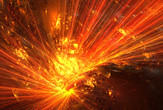Glimpse of Time Before Big Bang Possible
By Charles Q. Choi of Livescience
It may be possible to glimpse before the supposed beginning of time into the universe prior to the Big Bang, researchers now say.
Unfortunately, any such picture will always be fuzzy at best due to a kind of "cosmic forgetfulness."
The Big Bang is often thought as the start of everything, including time, making any questions about what happened during it or beforehand nonsensical. Recently scientists have instead suggested the Big Bang might have just been the explosive beginning of the current era of the universe, hinting at a mysterious past.
To see how far into history one might gaze, theoretical physicist Martin Bojowald at Pennsylvania State University ran calculations based on loop quantum gravity, one of a number of competing theories seeking to explain how the underlying structure of the universe works.

Past research suggested the Big Bang was preceded by infinite energies and space-time warping where existing scientific theories break down, making it impossible to peer beforehand. The new findings suggest that although the levels of energy and space-time warping before the Big Bang were both incredibly high, they were finite.
ReplyDeleteScientists could spot clues in the present day of what the cosmos looked like previously. If evidence of the past persisted after the Big Bang, its influence could be spotted in astronomical observations and computational models, Bojowald explained.
However, Bojowald also figures some knowledge of the past was irrevocably lost. For instance, the sheer size of the present universe would suppress precise knowledge of how the universe changed in size before the Big Bang, he said.
"It came as a big surprise that some properties of the universe before the Big Bang may have only such a weak influence on current observations that they are practically undetermined," Bojowald said of findings detailed online July 1 in the journal Nature Physics.
One implication of this "cosmic forgetfulness," as Bojowald calls it, is that history does not repeat itself-the fundamental properties of the current era of the universe are different from the last, Bojowald explained. "It's as if the universe forgot some of its properties and acquired new properties independent of what it had before," he told SPACE.com.
"The eternal recurrence of absolutely identical universes would seem to be prevented by the apparent existence of an intrinsic cosmic forgetfulness," he added.
These findings differ from a cyclic model of the cosmos from cosmologist Paul Steinhardt at Princeton and theoretical physicist Neil Turok at Cambridge, which envisions an infinite series of Big Bangs preceding our universe caused by additional membranes or "branes" of reality perpetually colliding and bouncing off each other. Steinhardt said he felt Bojowald's calculations were concrete, but needed further elaboration to include the interplay of different kinds of matter and radiation.
Cosmologist Carlo Rovelli at the Center of Theoretical Physics in Marseilles, France, found it "remarkable" that the new work could delve past the Big Bang. He added the work had to lead to predictions that could be compared to cosmological observations "in order to become credible."